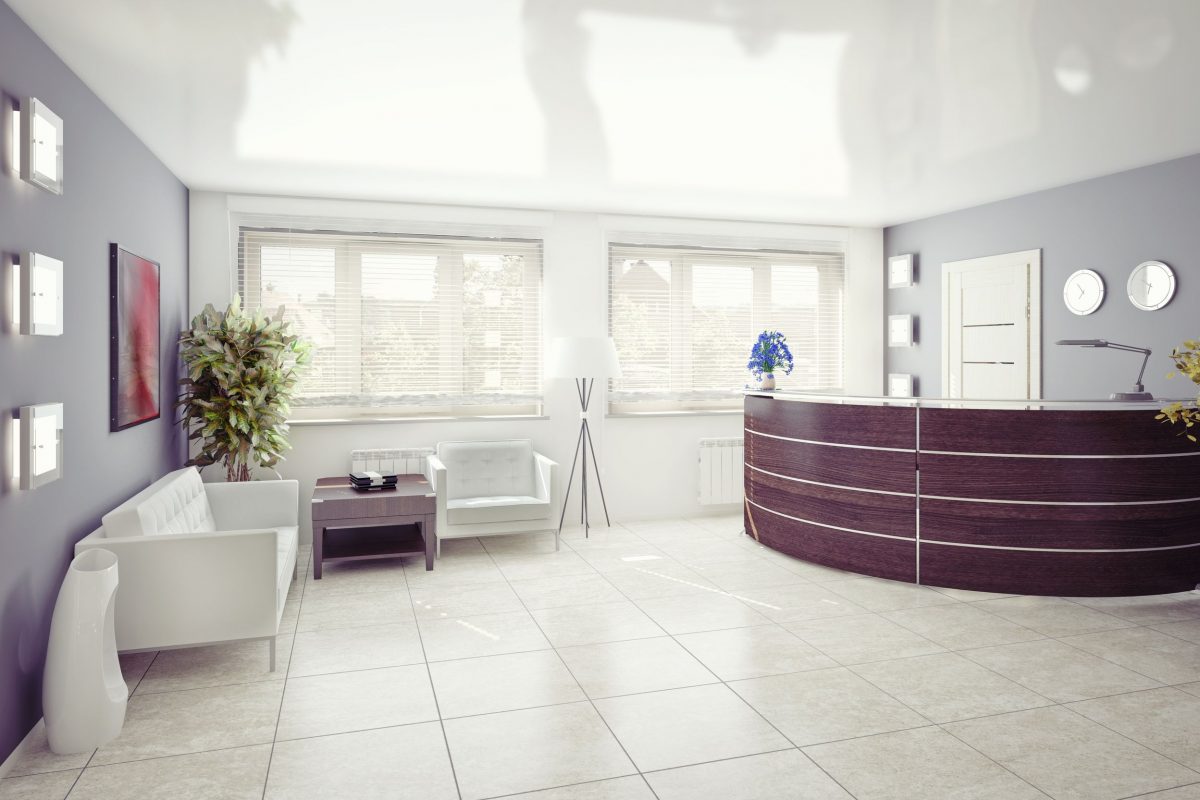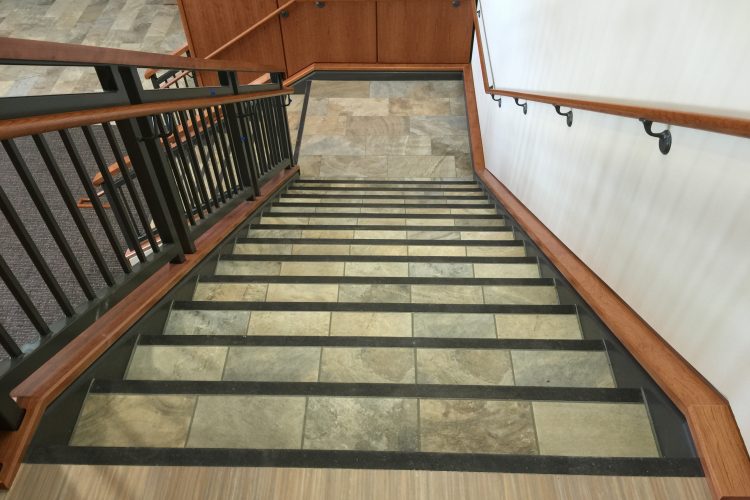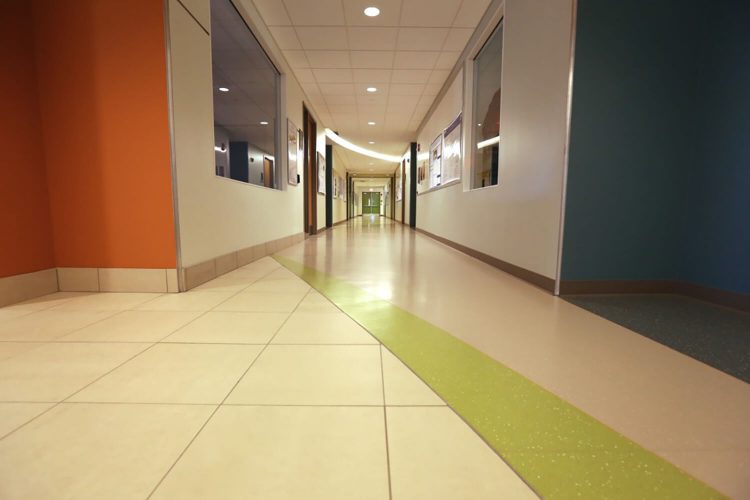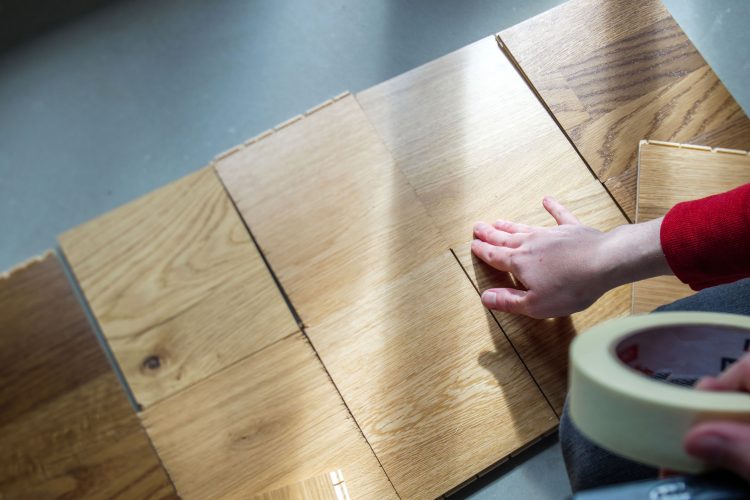Commercial Porcelain Tile: Why It’s a Great Option Compared to Ceramic Tile

Greenfield Flooring’s commercial ceramic and porcelain tiles are a popular choice for businesses that need floor coverings that look great and can withstand significant foot traffic. Read on to learn everything you need to know about the different types of tiles for senior living, healthcare, hospitality, workplace and construction projects. We’ll discuss the differences between ceramic and porcelain tiles, why commercial porcelain tile is a great option for businesses, and what to look for when choosing tile coverings for your commercial property. So, whether you’re looking for a new floor covering for your business or are just curious about the differences between these two types of tiles, keep reading!
What’s the difference between ceramic and porcelain tiles?
Commercial ceramic tiles are made of natural clay that is fired in a kiln. The firing process hardens the clay, making the tile strong and durable.
Porcelain tiles are also made of clay, but they undergo a different manufacturing process. In addition to being fired in a kiln, porcelain tiles are also heated at a higher temperature than ceramic tiles. This makes them more dense and less porous, which gives them a number of advantages over ceramic tiles.
What are the advantages of porcelain tile?
There are many advantages to using commercial porcelain tile:
- Porcelain tiles are more durable and less porous than ceramic tiles, making them more resistant to staining and easier to clean.
- Porcelain tiles are also less likely to chip or crack than ceramic tiles.
- Porcelain tiles come in a wide variety of colors, styles, and textures, so you’re sure to find an option that fits your commercial space.
- Porcelain tiles are also environmentally friendly, as they are made of natural materials and can be recycled.
- Porcelain tiles are less likely to absorb moisture, making them ideal for bathrooms, kitchens, and other wet areas.
Porcelain floor tile is a great option for businesses because it is more durable than ceramic tile and can withstand heavy foot traffic. It is also more resistant to staining and fading, making it a good choice for businesses that want their floor coverings to look new for years to come.
How long have ceramic and porcelain tiles been used?
Ceramic tiles have been used for centuries, dating back to the Roman Empire. Porcelain tiles were first developed in China during the Tang Dynasty, and they were not introduced to Europe until the 18th century.
These tiles have become more popular in recent years because of their many advantages over other types of flooring, such as carpet and hardwood.
What are the different types of commercial ceramic and porcelain tiles?
There are many different types of commercial tiles, including glazed, unglazed, polished, and matte.
- Glazed tiles have a smooth, glossy surface that is easy to clean.
- Unglazed tiles have a natural, rustic look and feel.
- Polished tiles have a high-gloss finish that reflects light and makes the tile easy to clean.
- Matte tiles have a non-reflective finish that gives the tile a more natural look.
The manufacturing process for commercial ceramic tile flooring and porcelain tiles is different depending on the type of tile.
- Glazed tiles are dipped in a glaze and then fired in a kiln.
- Unglazed tiles are simply fired in a kiln.
- Polished tiles are first ground down to create a smooth surface, then they are fired in a kiln.
- Matte tiles are first ground down to create a smooth surface, then they are treated with a chemical that gives them their non-reflective finish.
What are the different grades of commercial tile?
There are three different grades of commercial tile: Grade I, Grade II, and Grade III.
- Grade I tiles are the most durable and can be used in high-traffic areas. They are made of high-quality materials and are less likely to chip or crack. They are best for commercial businesses that want their floor coverings to last for many years.
- Grade II tiles are less durable than Grade I tiles, but they are still a good choice for commercial spaces. They are made of lower-quality materials and are more likely to chip or crack. They are best for commercial businesses that do not have as much traffic and can replace their floor coverings more often.
- Grade III tiles are the least durable and should only be used in low-traffic areas. They are made of lower-quality materials and are more likely to chip or crack. They are best for commercial businesses that do not have a lot of traffic and can replace their floor coverings more often.
What is the difference between standard and premium tiles?
Standard tiles are the most common type of commercial tile. They are made of high-quality materials and are less likely to chip or crack.
Premium tiles are made of higher-quality materials and are more durable than standard tiles. They are less likely to chip or crack and will last longer. Premium tiles are a good choice for commercial businesses that want their floor coverings to last for many years.
What are commercial ceramic and porcelain tiles used for?
Ceramic and porcelain tiles can be used for a variety of commercial applications, including flooring, countertops, backsplashes, and wall cladding. They are a popular choice for businesses because they are durable, easy to clean, and available in a wide variety of colors and styles.
- Flooring: Ceramic and porcelain tiles are a popular choice for flooring because they are durable and easy to clean. They can be used in a variety of commercial spaces, including office buildings, retail stores, and restaurants.
- Countertops: Ceramic and porcelain tiles can also be used for countertops. They are a popular choice because they are heat-resistant and easy to clean. They can be used in a variety of commercial spaces, including kitchens, bathrooms, and laundry rooms.
- Backsplashes: Ceramic and porcelain tiles can also be used for backsplashes. They are a popular choice because they are easy to clean and available in a wide variety of colors and styles.
- Wall cladding: Ceramic and porcelain tiles can also be used for wall cladding. They are a popular choice because they are durable and available in a wide variety of colors and styles.
What to look for when choosing commercial ceramic and porcelain tiles
When choosing commercial ceramic and porcelain tiles, you should consider the following factors:
- The intended use of the tile: Will it be used for flooring, countertops, backsplashes, or wall cladding?
- The traffic in the area: Will the tile be used in a high-traffic area or a low-traffic area?
- The budget: commercial ceramic and porcelain tiles can vary in price depending on the quality of the tile.
- The style: commercial ceramic and porcelain tiles are available in a wide variety of colors and styles.
- The installation: commercial ceramic and porcelain tiles can be installed by a professional or do-it-yourself.
Why commercial porcelain tile is a great option
- Porcelain tile is a type of ceramic tile that is made of finer, denser clay and fired at a higher temperature.
- Porcelain tiles are more durable than ceramic tiles and can be used in high-traffic areas.
- They are also less likely to chip or crack.
- Porcelain tiles are available in a wide variety of colors and styles.
- They are easy to clean and maintain.
- Porcelain tiles can be installed by a professional or do-it-yourself.
How to choose the best tile for your business
Choosing the best tile for your business is a matter of personal preference. However, there are a few things you should keep in mind when making your decision. First, consider the type of business you have and the amount of foot traffic your floors will get. If you have a high-traffic business, like a restaurant or retail store, you’ll want to choose a tile that is durable and easy to clean. You’ll also want to think about the style of your business and choose a tile that complements your décor. Finally, consider your budget and choose a tile that is affordable and will last for years to come.
Contact Greenfield Flooring today
Greenfield Flooring’s commercial ceramic and porcelain tiles are durable, easy to clean, and available in a wide variety of colors and styles.
A great choice for businesses that want their floor coverings to look new for years to come is commercial porcelain tile. When choosing commercial ceramic and porcelain tiles, it is important to consider the different types of tiles, the grades of tiles, and the intended use for the tiles. With so many options available, there is sure to be a tile that is perfect for your commercial business.
Contact Greenfield Flooring today to learn more about our commercial ceramic and porcelain tiles! We would be happy to help you select the best tile for your business.
Related Posts

Durable Commercial Flooring: Everything You Need to Know About Different Types

Pros and Cons of 8 Common Commercial Flooring Types

